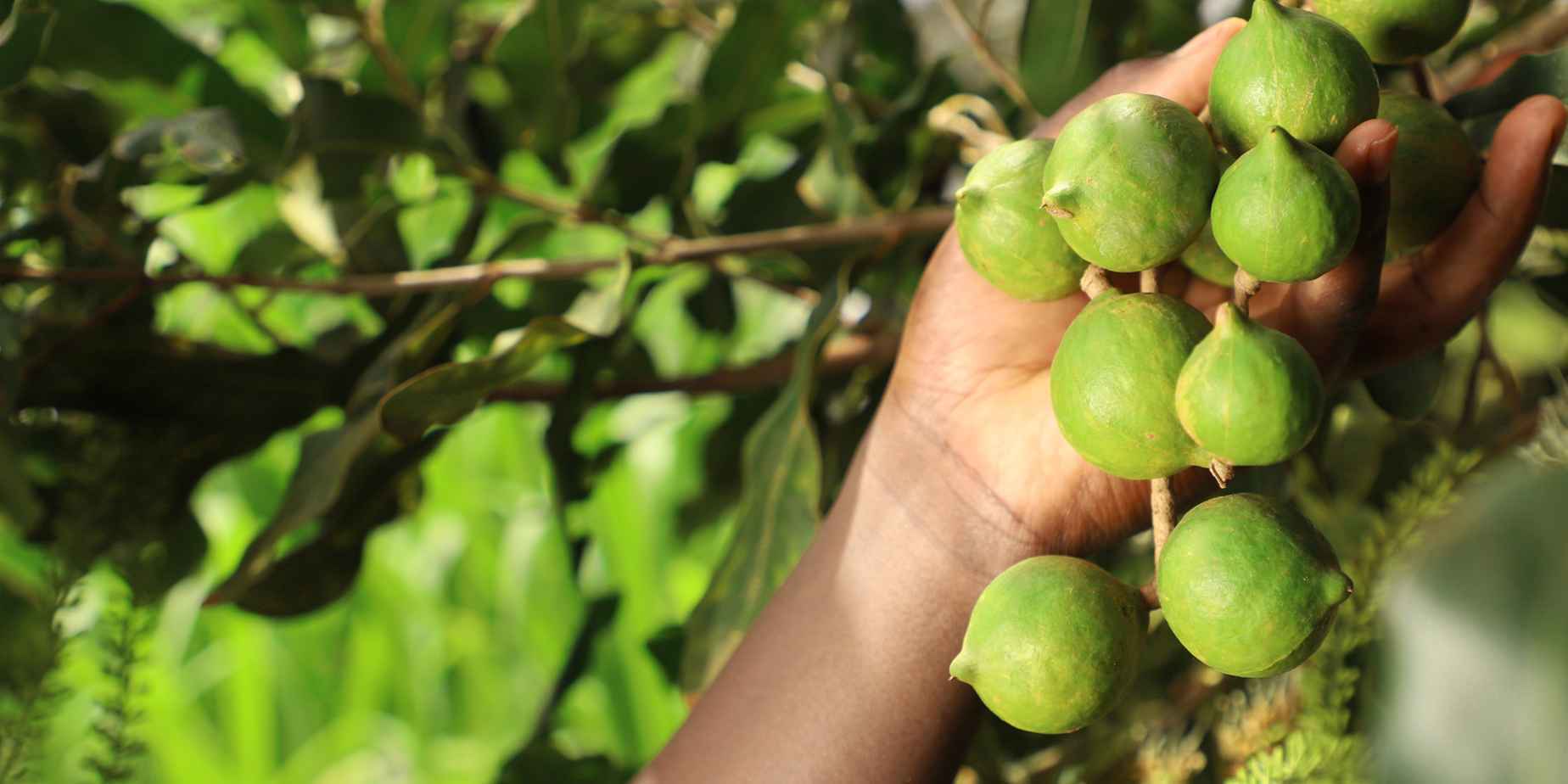Supply chain manager Mike Margiciok from the German-Kenyan company LIMBUA explains their approach: “We don't view Kenyan farmers as our employees, but as partners. Without the farmers, we have no product. And without us, it’s difficult for them to access international markets. We can pay them a fair price because we buy directly from the farmers and cut out the need for intermediaries in the supply chain. As a result, the entire processing of the harvest takes place in Kenya. This approach not only creates more jobs in Kenya but also allows us to offer affordable prices to our international customers.”

From tree to nut: a labour-intensive process
The farmers grow different types of crops such as mangoes, avocados and macadamia nuts. Growing and processing macadamia nuts is a labour-intensive process. The ripe green fruits are harvested, dried and taken to one of LIMBUA's four factories. “Here, employees manually crack the brown shell so we can deliver the ivory-coloured nut in perfect condition,” Mike explains. “The manual work ensures higher quality and therefore a better price for the farmer and our employees.”
The nuts are then washed, packaged and transported to Germany by container ship. From there, they are resold to international customers. “By allowing the entire process to take place in Kenya, as much value as possible remains in Kenya, in the form of employment. And because labour costs are lower in Kenya than in Europe, we keep the costs low for a high-quality product.”
Fair trade, fair price
Mike describes how LIMBUA offers farmers certainty: “We work with contracts that set a minimum price. This protects farmers from fluctuations in market price. Incidentally, the contract does not mean that farmers are obliged to sell their crops exclusively to us. They are free to do so.”
LIMBUA also tackles susceptibility to fraud. The company has developed a digital system that allows farmers to weigh their harvest and confirm payment with fingerprint or facial recognition. “This ensures farmers are paid fairly, and we can guarantee the organic origin of our products.”
From toxic to natural: an organic transformation
A prerequisite for working with LIMBUA is the switch to organic farming. That was a big change for many farmers. In the past, intermediaries sometimes paid them with pesticides instead of money, without explaining the harmful effect this had on their land. LIMBUA takes a different approach. “We help farmers convert by supplying organic certified trees from our own nursery. We also offer training in organic farming. Local field workers support farmers throughout the year with advice and materials,” says Mike.
The organic approach ensures greater biodiversity. “We encourage farmers to produce a diverse range of crops, such as growing mango trees and avocados in the shade of the macadamia trees. This makes their land more fertile, improves natural pest control and gives them more products to sell. And it reduces dependence on a single crop and generates additional income.”
The power of women
The number of women employed at LIMBUA is striking. More than half of the farmers are women. While in the factories, women make up three-quarters of the workforce. “Many women are responsible for running both the household and the farm,” says Mike. “We prefer to structure our workforce this way because we appreciate the power of women and all they do to take care of their families and communities.” To increase job security, employees continue to receive part of their salary outside the harvest or processing season. “This means they don't have to look for another job or become dependent on temporary income.”

A strong green and social approach
Hivos-Triodos Fonds has provided a value chain loan to LIMBUA, enabling fair and immediate payments to farmers upon delivery of their macadamia nuts. Fund manager Judith Santbergen praises LIMBUA for their green and social approach. “It fits very well with what we want to achieve with Hivos-Triodos Fonds. Working with smallholder farmers, employing the farmer’s family members, the focus on female employees; this provides a very important contribution to local economic development. And it is very impressive how LIMBUA manages to obtain biodynamic certificates like Demeter with their methods.”
But LIMBUA is more than organic production with a good export model and a good price for the farmer, Judith emphasises. “We also think the way the company contributes to the country's climate resilience is important. Its use of organic methods and agroforestry improve soil quality and biodiversity, making the soil more productive for the family for longer. As well as growing crops for export, farmers grow their own food on the land too.” Judith explains that LIMBUA is also working hard to make its business operations circular. “It makes compost from the waste generated during processing, which it distributes to the farmers. LIMBUA is a frontrunner when it comes to making its business process greener. Although our financing is currently linked to exports, we would like to grow with them and look at how we can support initiatives that align with the exports.”
Mike shares an example of one of LIMBUA's initiatives: “Many families still rely on harmful fuels and stoves for cooking. We're working to replace these with cleaner, healthier cookers powered by biogas from cow manure. This will improve the health of families in rural areas and reduce CO2 emissions.” The company also plans to invest in solar panels to generate energy. “It will reduce our reliance on energy suppliers and open up more opportunities for remote farmers to join us. That’s how we want to measure our success; not in numbers, but in the growing community of affiliated farmers.”







